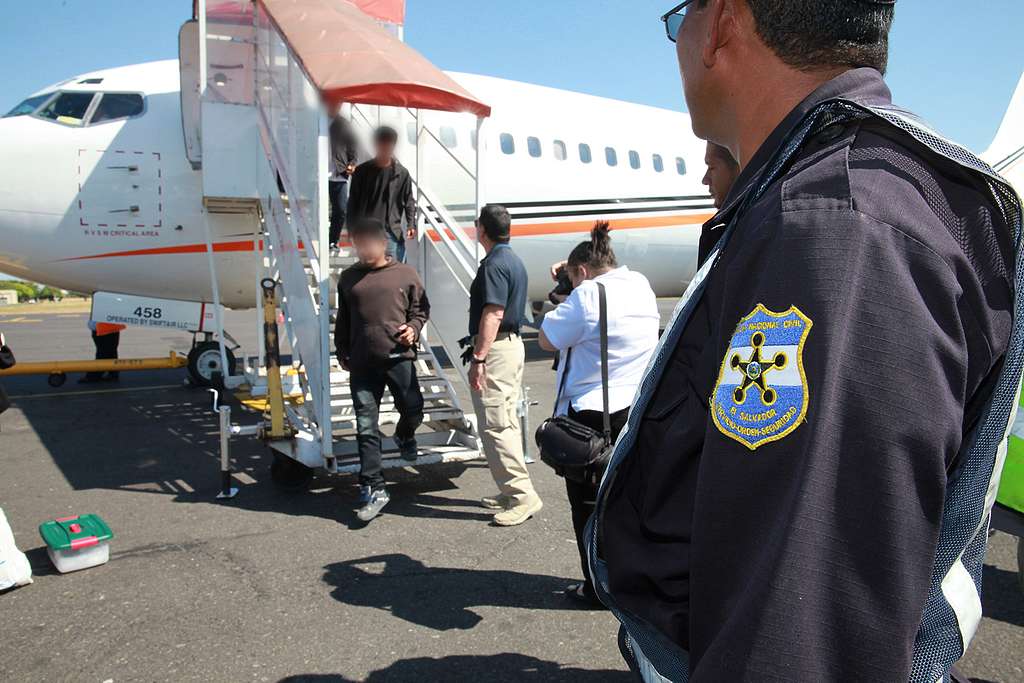By Ricardo Vaz for Venezeulanalysis
A group of 238 Venezuelans deported by the US to a prison in El Salvador have been denied access to legal representation.
Lawyers hired by the Nicolás Maduro government told reporters that they have not been allowed to communicate with the Venezuelan detainees in the Central American country’s notorious CECOT prison.
“We have requested that the Human Rights Office follow up on these cases,” lead attorney Jaime Ortega said in an interview on Thursday. “We asked the penal center authority for a communication channel with our clients. We have received no reply.”
Ortega’s law firm was tasked with defending 30 migrants that the Donald Trump administration forcibly sent to El Salvador in mid-March, using the 1798 Alien Enemies Act. The legal team filed a habeas corpus appeal before the Salvadoran Supreme Court and argued that it would extend to all 238 Venezuelans. The appeal remains unanswered.
Ortega stressed that the lawyers have not been able to verify their clients’ incarceration conditions, but stressed that they “had not committed any crime” on Salvadoran soil and thus should not be treated under a maximum security regime.
“Beyond the habeas corpus, we are also weighing a challenge to the US-El Salvador treaty on constitutional grounds,” Ortega said. He added that another option was requesting asylum from a third country embassy in order to secure the Venezuelans’ return home.
The Trump administration struck a deal with the Nayib Bukele government to transfer deported migrants to El Salvador for a reported fee of US $20,000 per detainee per year.
In parallel to the legal efforts in El Salvador, lawyers representing Edicson Quintero, a Venezuelan among the 238 sent to CECOT, introduced a habeas corpus petition before a US federal court. The lawsuit demands Quintero’s release from the maximum security prison on the grounds of violating his right to due process.
The attorneys argued that the Venezuelan migrant’s incarceration “amounts to an effective life sentence” and that Quintero had committed no crime in the US. He had spent one year in detention after crossing the border and turning himself in to immigration authorities. The US government alleged he belonged to the Tren de Aragua gang before sending him to CECOT.
Investigations have revealed that the vast majority of the Venezuelan detainees in El Salvador had no criminal record in the US, while gang allegations relied on profiling indicators such as tattoos and social media posts.
Migrant crackdown challenged in courts
In its second term, the Trump administration has prioritized cracking down on migration, particularly Venezuelan. In March, it invoked the Alien Enemies Act over an alleged “invasion” by Tren de Aragua to fast-track deportations.
Following a meeting with Salvadoran President Nayib Bukele at the White House on April 14, Trump told reporters that his administration would continue with mass deportations and mentioned the possibility of sending US citizens deemed “homegrown criminals” to El Salvador. Additionally, Trump stated that the US would assist Bukele in opening more detention centers.
However, the White House’s efforts have also faced legal setbacks. Federal Judge James Boasberg initially put a temporary block on the use of the 18th-century law, but the Trump administration moved forward with the flights to El Salvador.
On Wednesday, Boasberg ruled that there is “probable cause” to hold the executive branch in criminal contempt of the court orders. The judge will now seek sworn testimonies from officials, which may eventually lead to prosecutions.
Boasberg’s initial ruling was upheld by an appeals court before being overturned by the US Supreme Court. The maximum judicial authority backed the administration’s use of the Alien Enemies Act but demanded that migrants be allowed to plead their cases in court.
On Saturday, the Supreme Court voted 7-2 to temporarily block new deportations under the 18th-century wartime legislation following an emergency appeal as a group of 50 Venezuelans reportedly faced imminent expulsion. The order followed similar prohibitions from lower courts in Nevada, Colorado, New York and Texas.
Alongside mass deportations, the Trump administration has also moved to shut down programs allowing migrants to stay in the US legally. On Monday, Massachusetts District Judge Indira Talwani issued a temporary stay ruling halting the termination of the so-called “parole” initiative granting legal status and work permits to migrants from Cuba, Haiti, Nicaragua and Venezuela (CHNV).
Talwani concluded that the Department of Homeland Security could not withdraw parole and employment status without a “case-by-case review.” The White House has vowed to appeal the stay order. The administration is likewise challenging a block to its attempt to end Temporary Protected Status (TPS) for some 600,000 Venezuelan migrants.

